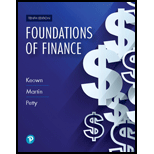
To discuss: The difference between debentures and mortgage bonds.
Explanation of Solution
The difference between debentures and mortgage bonds are as follows:
A debenture can be termed as any unsecured long-term debt. Because these bonds are unsecured, the earning capacity of the issuing organization is of big worry to the bondholders. They are additionally seen as being extra risky than secured securities and therefore, must furnish the investors with a better return than secured bonds give. Frequently the issuing company tries to give some assurance to the holder through the disallowance of any extra encumbrance of assets.
This disallows the upcoming issuance of secured long-term debt that would additionally connect the company's assets and leave the bondholders fewer secured. In terms of the issuing firm, the main benefit of debentures is that no property must be secured by them. This enables the firm to give debt and still save some future acquiring power.
A mortgage bond is a type of bond that is secured by a lien on real property. Normally, the actual value of the real property is higher than that of the mortgage bonds which are issued. This gives the mortgage bondholders an edge of protection in the occasion the market value of the secured property decreases.
On account of foreclosure, the trustees have the ability to sell the secured property and utilize the returns to pay the bondholders. If the returns from such sale don't cover the bonds, the bondholders become general creditors, like debenture bondholders, for the unpaid segment of the debt.
Want to see more full solutions like this?
Chapter 7 Solutions
EBK FOUNDATIONS OF FINANCE
- hello tutor:If submitted image is blurr then please comment i will write values. i will give unhelpful please.arrow_forwardLara Fredericks is interested in two mutually exclusive investments. Both investments cover the same time horizon of 5 years. The cost of the first investment is $9900, and Lara expects equal and consecutive year-end payments of $3400. The second investment promises equal and consecutive payments of $4100 with an initial outlay of $12500 required. The current required return on the first investment is 8.4 %, and the second carries a required return of 10.4 %.a. What is the net present value of the first investment?b. What is the net present value of the second investment?c. Being mutually exclusive, which investment should Lara choose? d. Which investment is relatively more risky? Explain.arrow_forwardWhat are some of the characteristics of a firm with a long operating cycle?arrow_forward
- About this Assignment For this Corporate Finance 301 assignment, you will submit a research paper that analyzes the types of organizational business structures. You will apply knowledge of business structure concepts as acquired in the course. The research paper should follow APA formatting style. Project Prompts The written research paper should be at least 1,000 to 1,200 words in length and should include four sections based on the business structures studied throughout the course. Define each business structure, compare the corporate finance strategies of the four business structures, discuss the advantages and disadvantages of each business structure, and how each varies in taxation. Research Paper Sections ⚫ Sole Proprietorship ⚫ Partnership • Corporation ⚫ Limited Liability Company (LLC)arrow_forwardPLEASE ANSWER THE COLUMN FULLY AND CORRECTLY PLEASE DO THE RIGHT CALCULATION DOUBLE CHECK AS WELL TO GIVE ME THE RIGHT ANSWER REQUIRED: Given the following information, what are the NZD/SGD currency against currency bid-ask quotations? Note: Do not round intermediate calculations. Round your answers to 4 decimal places. Bank Quotations American Terms European Terms Bid Ask Bid Ask New Zealand dollar 0.733 0.7340 1.3870 1.3884 Singapore dollar 0.6186 0.6191 1.6423 1.6436 answer Bid Ask New Zealand dollar ? ? Singapore dollar ? ?arrow_forwardAbout this Assignment For the Corporate Finance 301 assignment, you will submit a research paper that analyzes and discusses organizational financial risks. You will apply knowledge acquired in the course and use the concepts of multiple financial risks as the basis of research and analysis. The research paper should follow APA formatting style. Audience: upper-level business students. Project Prompt Write a 1,000-1,200-word analysis discussing financial risk concepts and assess the impact of the different financial risks on an organization. For this assignment, you will structure your assignment using four research paper sections associated with corporate risk management, as studied in the course. Base your research paper on the financial statements analyzed in Corporate Finance 301 assignment 2 and apply the knowledge acquired in the analysis. Define each financial risk, discuss the risk associated components, and evaluate the financial risks and how they affect the corporation's…arrow_forward
- Bobby Nelson, made deposits of $880 at the end of each year for 6 years. Interest is 6% compounded annually. What is the value of Bobby’s annuity at the end of 6 years?arrow_forward1. Find the future value if $1,250 is invested in Simple interest account paying 6.5%: a. for 5 years b. for 20 years 2. Find the future amount $ 35,000 is invested for 30 years at 4.25% compounded: a. annually b. Quarterly c. monthly d. weekly 3. How much should be put into an account today that pays 7.75% compounded monthly if you need $10,000 in 5 years. 4. Find the effective rate for: a. 5.75% compounded quarterly b. 6.25% compounded daily. 5. $50 is invested at the end of each month into an account paying 7.5% compounded monthly. How much will be in the account after 5 years?…arrow_forwardSolve step by step no aiarrow_forward
 Cornerstones of Financial AccountingAccountingISBN:9781337690881Author:Jay Rich, Jeff JonesPublisher:Cengage LearningPrinciples of Accounting Volume 1AccountingISBN:9781947172685Author:OpenStaxPublisher:OpenStax College
Cornerstones of Financial AccountingAccountingISBN:9781337690881Author:Jay Rich, Jeff JonesPublisher:Cengage LearningPrinciples of Accounting Volume 1AccountingISBN:9781947172685Author:OpenStaxPublisher:OpenStax College


